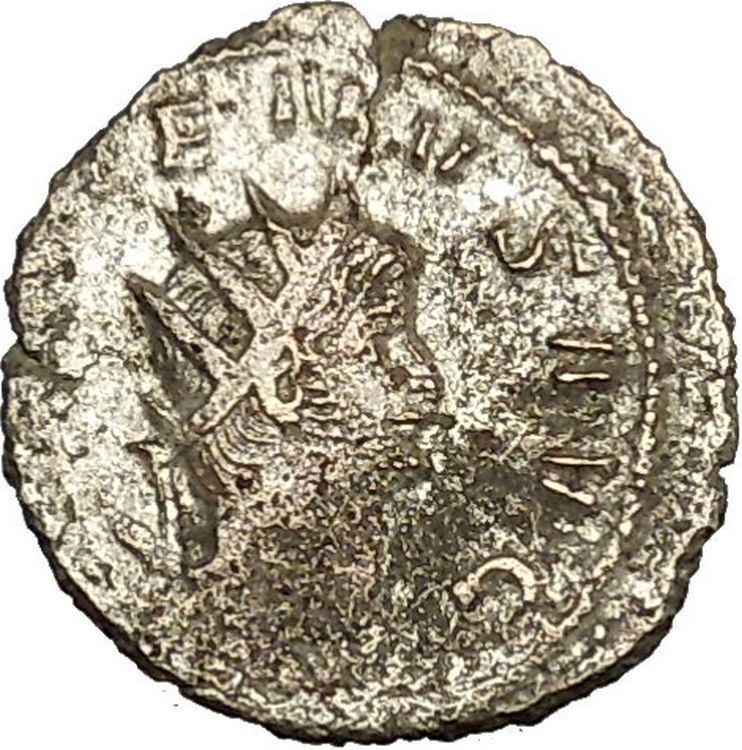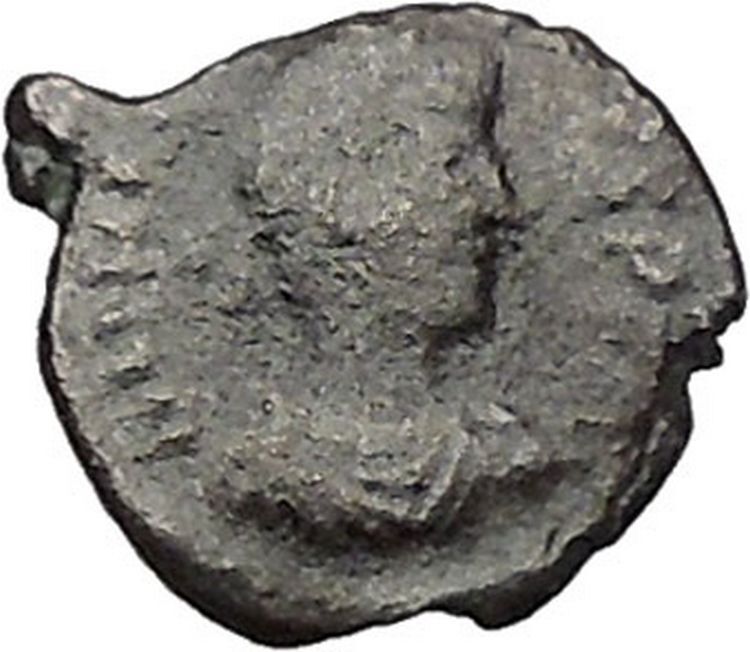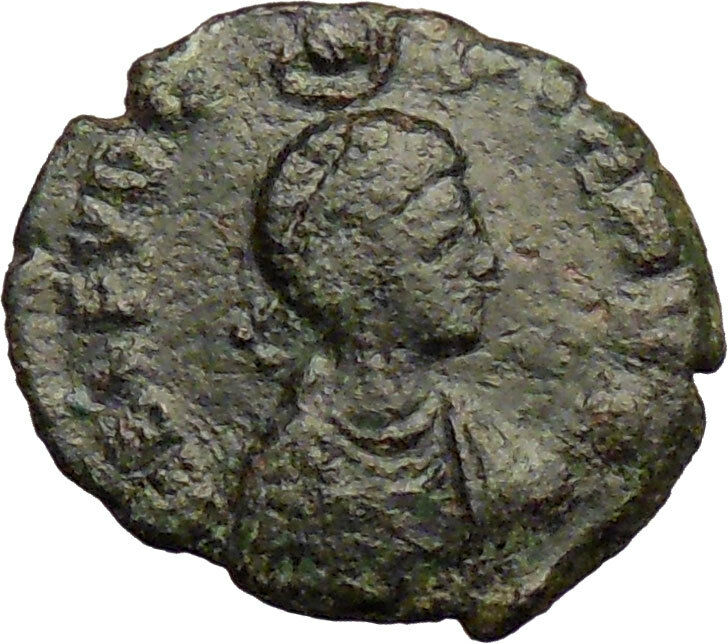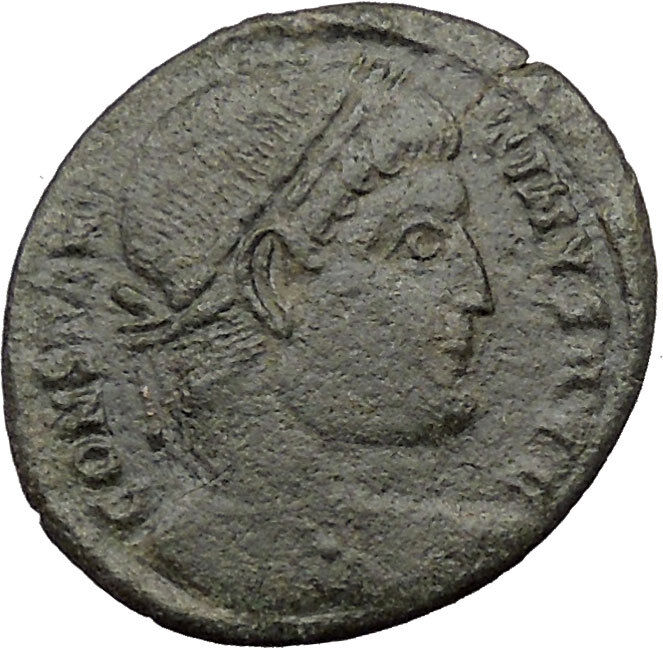|
Constans – Roman Emperor: 337-350 A.D. –
Bronze AE2 22mm (2.61 grams) Nicomedia mint circa 337-340 A.D.
Reference: Nicomedia RIC VIII 72
D N CONSTA-NS P F AVG, Pearl-diademed, draped, cuirassed bust left, globe in
right hand.
FEL TEMP REPA-RATIO, Helmeted soldier, spear in left hand, advancing right, head
left; with his right
hand he leads a small bare-headed figure from a hut beneath a tree. The spear
points downwards,
between the soldier’s legs., SMNA in ex.
You are bidding on the exact item pictured,
provided with a Certificate of Authenticity and Lifetime Guarantee of
Authenticity.
Constans (Latin:
Flavius Julius Constans Augustus)
(c.323–350) was
Roman Emperor
from 337 to 350. He defeated his
brother
Constantine II
in 340, but anger in the army
over his personal life and preference for his barbarian bodyguards led the
general Magnentius
to rebel, resulting in the
assassination of Constans in 350.

Career
Constans was the third and youngest son of
Constantine the Great
and
Fausta
, his father’s second wife. He was
educated at the court of his father at
Constantinople
under the tutelage of the poet
Aemilius Magnus Arborius
.
On 25 December 333, Constantine I elevated Constans to the rank
of
Caesar
at
Constantinople
. Constans became engaged to
Olympias
, the daughter of the
Praetorian Prefect
Ablabius
, but the marriage never came to
pass.With Constantine’s death in 337, Constans and his two brothers,
Constantine II
and
Constantius II
, divided the Roman world between
themselves and disposed of virtually all relatives who could possibly have a
claim to the throne.The army proclaimed them
Augusti
on September 9, 337. Almost
immediately, Constans was required to deal with a
Sarmatian
invasion in late 337, over whom he
won a resounding victory.

Division of the Roman Empire among the Caesars appointed by
Constantine I
: from left to right,
the territories of
Constantine II
, Constans,
Dalmatius
and
Constantius II
. After the death of
Constantine I (May 337), this was the formal division of the Empire,
until Dalmatius was killed and his territory divided between
Constans and Constantius.
Constans was initially under the guardianship of Constantine II. The original
settlement assigned Constans the
praetorian prefectures
of
Italy and Africa
.
Constans was unhappy with this division, so the brothers met at
Viminacium
in 338 to revise the boundaries.
Constans managed to extract the prefecture of
Illyricum
and the
diocese of Thrace
,provinces that were originally to be ruled by his cousin
Dalmatius
, as per Constantine I’s proposed
division after his death.
Constantine II soon complained that he had not received the amount of territory
that was his due as the eldest son.
Annoyed that Constans had received Thrace and
Macedonia
after the death of Dalmatius,
Constantine demanded that Constans hand over the African provinces, which he
agreed to do in order to maintain a fragile peace.
Soon, however, they began quarreling over which parts of the African provinces
belonged to Carthage
, and thus Constantine, and which
belonged to Italy
, and therefore Constans.
This led to growing tensions between the two brothers, which were only
heightened by Constans finally coming of age and Constantine refusing to give up
his guardianship. In 340 Constantine II invaded Italy.
Constans, at that time in
Dacia
, detached and sent a select and
disciplined body of his Illyrian troops, stating that he would follow them in
person with the remainder of his forces.
Constantine was eventually trapped at
Aquileia
, where he died, leaving Constans to
inherit all of his brother’s former territories –
Hispania
,
Britannia
and
Gaul.
Constans began his reign in an energetic fashion.
In 341-42, he led a successful campaign against the
Franks
, and in the early months of 343 he
visited
Britain
.
The source for this visit,
Julius Firmicus Maternus
, does not provide a
reason, but the quick movement and the danger involved in crossing the
channel
in the dangerous winter months suggests
it was in response to a military emergency, possibly to repel the
Picts
and
Scots
.
Regarding religion, Constans was tolerant of Judaism but promulgated an edict
banning pagan sacrifices in 341.
He suppressed Donatism
in Africa and supported
Nicene orthodoxy
against
Arianism
, which was championed by his brother
Constantius. Although Constans called the
Council of Sardica
in 343 to settle the
conflict,
it was a complete failure,
and by 346 the two emperors were on the point of open warfare over the dispute.
The conflict was only resolved by an interim agreement which allowed each
emperor to support their preferred clergy within their own spheres of influence.
Death
In the final years of his reign, Constans developed a reputation for cruelty
and misrule.
Dominated by favourites and openly preferring his select
bodyguard, he lost the support of the
legions
who were also offended by his
homosexuality. In 350, the general
Magnentius
declared himself emperor at
Augustodunum
with the support of the troops on
the Rhine
frontier, and later the western provinces
of the Empire. Constans was enjoying himself nearby when he was notified of the
elevation of Magnentius.
Lacking any support beyond his immediate household, he was
forced to flee for his life. As he was trying to reach either Italy or Spain,
supporters of Magnentius cornered him in a fortification in
Vicus Helena
(now
Elne) in the
Pyrenees
, southwestern
Gaul
, where he was killed after seeking
sanctuary in a temple.
The term “barbarian” refers to a person who is perceived to be
uncivilized. The word is often used either in a general reference to member of a
nation or
ethnos
, typically a
tribal society
as seen by an urban
civilization
either viewed as inferior, or
admired as a
noble savage
. In idiomatic or figurative usage,
a “barbarian” may also be an individual reference to a brutal, cruel, warlike,
insensitive person.
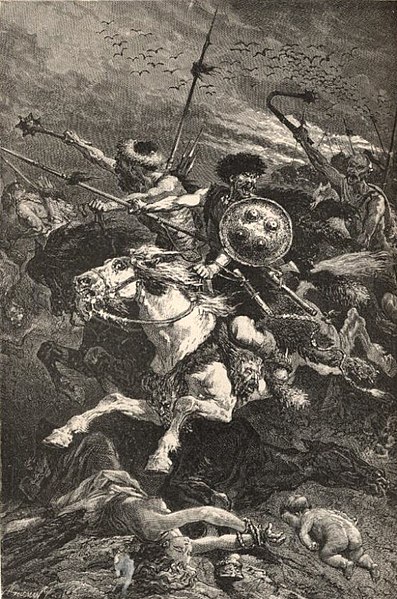
The
term originates from the
Greek
word βάρβαρος (barbaros). Hence
the Greek idiom “πᾶς μὴ Ἕλλην βάρβαρος” (pas mē Hellēn barbaros) which
literally means “whoever is not Greek is a barbarian”. In ancient times, Greeks
used it mostly for people of different cultures, but there are examples where
one Greek city or state would use the word to attack another (e.g. haughty
Athenians
calling the
Boeotians
barbarian);[2]
in the early modern period and sometimes later, Greeks used it for the
Turks
, in a clearly pejorative way.[3][4]
Comparable notions are found in non-European civilizations. In the
Roman Empire
, Romans used the word “barbarian”
for many people, such as the
Berbers
,
Germanics
,
Celts
,
Carthaginians
,
Iberians
,
Thracians
and
Persians
.
Etymology

Routes taken by
barbarian invaders
, 5th century
CE

Routes taken by
Mongol invaders
, 13th century
The
Ancient Greek
word
βάρβαρος
(barbaros), “barbarian”, was an
antonym
for
πολίτης
(politēs), “citizen” (from πόλις
– polis
, “city-state”). The sound of
barbaros
onomatopoetically
evokes the image of babbling
(a person speaking a non-Greek language).[5]
The earliest attested form of the word is the
Mycenaean Greek
pa-pa-ro, written in
Linear B
syllabic script.
The Greeks and Romans used the term as they encountered scores of different
foreign cultures, including the
Egyptians
,
Persians
,
Medes
,
Celts
,
Germanic peoples
,
Phoenicians
and
Carthaginians
. In fact, it became a common term
to refer to all foreigners. However in various occasions, the term was also used
by Greeks, especially the
Athenians
, to deride other Greek tribes and
states (such as Epirotes
,
Eleans
,
Macedonians
and
Aeolic
-speakers) in a pejorative and
politically motivated manner.[8]
Of course, the term also carried a cultural dimension to its dual meaning.The
verb βαρβαρίζειν (barbarízein) in
ancient Greek
meant imitating the linguistic
sounds non-Greeks made or making grammatical errors in Greek.
Plato
(Statesman 262de) rejected the
Greek–barbarian dichotomy as a logical absurdity on just such grounds: dividing
the world into Greeks and non-Greeks told one nothing about the second group. In
Homer
‘s works, the term appeared only once (Iliad
2.867), in the form βαρβαρόφωνος (barbarophonos)
(“of incomprehensible speech”), used of the
Carians
fighting for
Troy during the
Trojan War
. In general, the concept of
barbaros did not figure largely in archaic literature before the 5th century
BC
.[11]
Still it has been suggested that “barbarophonoi” in the Iliad signifies
not those who spoke a non-Greek language but simply those who spoke Greek badly.
A change occurred in the connotations of the word after the
Greco-Persian Wars
in the first half of the 5th
century BC. Here a hasty coalition of Greeks defeated the vast
Achaemenid Empire
. Indeed in the Greek of this
period ‘barbarian’ is often used expressly to mean
Persian
.
Greek barbaros was the etymological source for many words meaning
“barbarian”, including English barbarian, which was first recorded in
16th-century
Middle English
.
A word barbara- is also found in the
Sanskrit
of ancient India. The Greek word
barbaros is related to Sanskrit barbaras (stammering).
Semantics

“Germanic
warriors” as depicted in
Philipp Clüver
‘s Germania
Antiqua (1616)
“Barbarian” in Greek historical contexts
Slavery in Greece

Slaves in chains, relief found at Smyrna (present day
İzmir
,
Turkey
), 200 AD
A parallel factor was the growth of
chattel slavery
especially at
Athens
. Although enslavement of Greeks for
non-payment of debt
continued in most Greek states, it was
banned at Athens under
Solon
in the early 6th century
BC
. Under the
Athenian democracy
established ca. 508 BC
slavery
came to be used on a scale never before
seen among the Greeks. Massive concentrations of slaves were worked under
especially brutal conditions in the silver mines at
Laureion
—a major vein of silver-bearing ore was
found there in 483 BC—while the phenomenon of skilled slave craftsmen producing
manufactured goods in small factories and workshops became increasingly common.
Furthermore, slaves were no longer the preserve of the rich: all but the
poorest of Athenian households came to have slaves to supplement the work of
their free members. Overwhelmingly, the slaves of Athens were “barbarian” in
origin[citation
needed], drawn especially from lands around the
Black Sea
such as
Thrace
and
Taurica
(Crimea),
while from
Asia Minor
came above all
Lydians
,
Phrygians
and
Carians
.
Aristotle
(Politics
1.2–7; 3.14) even states that barbarians are slaves by nature.
From this period, words like barbarophonos, cited above from Homer,
began to be used not only of the sound of a foreign language but of foreigners
speaking Greek improperly. In Greek, the notions of language and reason are
easily confused in the word
logos
, so speaking poorly was easily
conflated with being stupid, an association not of course limited to the ancient
Greeks.
Further changes occurred in the connotations of barbari/barbaroi
in Late Antiquity
,[26]
when bishops and catholikoi were appointed to sees connected to cities
among the “civilized” gentes barbaricae such as in
Armenia
or
Persia
, whereas bishops were appointed to
supervise entire peoples among the less settled.
Eventually the term found a hidden meaning by
Christian
Romans
through the
folk etymology
of
Cassiodorus
. He stated the word barbarian
was “made up of barba (beard) and rus (flat land); for barbarians
did not live in cities, making their abodes in the fields like wild animals”.[27]
The female given name “Barbara”
originally meant “a barbarian woman”, and as such was likely to have had a
pejorative meaning—given that most such women in Graeco-Roman society were of a
low social status (often being slaves).[citation
needed][dubious
–
discuss
] However,
Saint Barbara
is mentioned as being the
daughter of rich and respectable Roman citizens. Evidently, by her time (about
300 CE
according to Christian
hagiography
, though some historians put the
story much later) the name no longer had any specific ethnic or pejorative
connotations. Alternatively her canonisation might have been intended to counter
any such pejorative connotations, especially if her story was fictitious, as
many authorities think possible, including the Roman Catholic Church since 1969
(for details of these doubts, see under
Saint Barbara, Veneration
).[original
research?]
Hellenic stereotypes
Out of those sources the Hellenic stereotype was elaborated: barbarians are
like children, unable to speak or reason properly, cowardly, effeminate,
luxurious, cruel, unable to control their appetites and desires, politically
unable to govern themselves. These stereotypes were voiced with much shrillness
by writers like
Isocrates
in the 4th century
BCE
who called for a war of conquest against
Persia
as a
panacea
for Greek problems.
However, the Hellenic stereotype of barbarians was not a universal feature of
Hellenic culture.
Xenophon
, for example, wrote the
Cyropaedia
, a laudatory fictionalised
account of
Cyrus the Great
, the founder of the Persian
empire, effectively a
utopian
text. In his
Anabasis
, Xenophon’s accounts of the
Persians and other non-Greeks he knew or encountered hardly seem to be under the
sway of these stereotypes at all.
The renowned orator
Demosthenes
made derogatory comments in his
speeches, using the word “barbarian.”
Barbarian is used in its Hellenic sense by
St. Paul
in the
New Testament
(Romans
1:14) to describe non-Greeks, and to describe one who merely speaks a
different language (1
Corinthians 14:11).
About a hundred years after Paul’s time,
Lucian
– a native of
Samosata
, in the former kingdom of
Commagene
, which had been absorbed by the
Roman Empire
and made part of the province of
Syria
– used the term “barbarian” to describe
himself. As he was a noted satirist, this could have been a deprecating
self-irony. It might also have indicated that he was descended from Samosata’s
original Semitic population – likely to have been called “barbarians” by later
Hellenistic, Greek-speaking settlers, and who might have eventually taken up
this appellation themselves.[28][29]
The term retained its standard usage in the
Greek language
throughout the Middle Ages, as
it was widely used by the
Byzantine Greeks
until the fall of the
Byzantine Empire
in the 15th century.
Cicero
described the mountain area of inner
Sardinia
as “a land of barbarians”, with these
inhabitants also known by the manifestly pejorative term latrones mastrucati
(“thieves with a rough garment in wool”). The region is up to the present known
as “Barbagia”
(in
Sardinian
“Barbàgia” or “Barbaza”), which is
traceable to this old “barbarian” designation – but no longer consciously
associated with it, and used naturally as the name of the region by its own
inhabitants.
The Dying Galatian
statue

The Dying Galatian,
Capitoline Museums
, Rome
Some insight about the Hellenistic perception of and attitude to “Barbarians”
can be taken from the “Dying
Galatian“, a statue commissioned by
Attalus I
of
Pergamon
to celebrate his victory over the
Celtic Galatians
in
Anatolia
(the bronze original is lost, but a
Roman
marble
copy was found in the 17th century).[30]
The statue depicts with remarkable realism a dying Celt warrior with a typically
Celtic hairstyle and moustache. He lies on his fallen shield while sword and
other objects lie beside him. He appears to be fighting against death, refusing
to accept his fate.
The statue serves both as a reminder of the Celts’ defeat, thus demonstrating
the might of the people who defeated them, and a memorial to their bravery as
worthy adversaries. The message conveyed by the sculpture, as
H. W. Janson
comments, is that “they knew how
to die, barbarians that they were.”[31]
The Greeks admired
Scythians
and
Galatians
as heroic individuals – even in the
case of Anacharsis
as philosophers – but considered
their culture to be barbaric. The
Romans
indiscriminately regarded the various
Germanic tribes
, the settled
Gauls
, and the raiding
Huns
as barbarians.
The Romans adapted the term to refer to anything non-Roman. The German
cultural historian Silvio Vietta points out that the meaning of the word
“barbarous” has undergone a semantic change in modern times, after Michel de
Montaigne used it to characterize the activities in the New World of the
Spaniards – supposedly representatives of the “higher” European culture – as
“barbarous”, in a satirical essay of the year 1580.[32]
It was not the supposedly “uncivilized” Indian tribes who were “barbarous”, but
the conquering Spaniards. Montaigne argued that Europeans noted the barbarism of
other cultures but not the crueler and more brutal actions of their own society,
particularly (in his time) in the so-called religious wars. We – the Europeans –
were the real “barbarians”. In this way, the Eurocentric argument was turned
around and applied against the European invaders. With this shift of meaning a
whole literature arose in Europe that characterized the indigenous Indian
peoples as innocent, and the militarily superior Europeans as “barbarous”
intruders into a paradisiacal world.[33][34]
Barbarian
puppet drinking game
In the Tang Dynasty houses of pleasure, where drinking games were common,
small puppets in the aspect of Westerners, in a ridiculous state of drunkenness,
were used in one popular permutation of the drinking game; so, in the form of
blue-eyed, pointy nosed, and peak-capped barbarians, these puppets were
manipulated in such a way as to occasionally fall down: then, whichever guest to
whom the puppet pointed after falling was then obliged by honor to empty his cup
of
Chinese wine
.[91]
Japanese culture
When Europeans came to
Japan
, they were called nanban
(南蛮?),
literally Barbarians from the South, because the
Portuguese
ships appeared to sail from the
South. The
Dutch
, who arrived later, were also called
either nanban or kōmō (紅毛?),
literally meaning “Red Hair.”
American cultures
In Mesoamerica the Aztec
civilization used the word “Chichimeca”
to denominate a group of nomadic hunter-gatherer tribes that lived in the
outskirts of the
Triple Alliance
‘s Empire, in the North of
Modern Mexico, which were seen by the Aztec people as primitive and uncivilized.
One of the meanings attributed to the word “Chichimeca” is “dog people”.
The
Incas
of South America used the term “puruma
auca” for all peoples living outside the rule of their empire (see
Promaucaes
).
The white settlers of the
United States
referred to Native Americans as
“savages.”
Early Modern period

A defeated
Sarmatian
barbarian serves as an
atlas
on a 16th-century
villa
in
Milan
. Sculpted by
Antonio Abbondio
for
Leone Leoni
Italians in the
Renaissance
often called anyone who lived
outside of their country a barbarian.
Spanish sea captain
Francisco de Cuellar
who sailed with the
Spanish Armada
in 1588 used the term ‘savage’
(‘salvaje’) to describe the
Irish people
.[92]
Marxist use of
“Barbarism”
In her “Junius Pamphlet” of 1916, strongly denouncing the then raging
First World War
,
Rosa Luxemburg
wrote: Bourgeois society
stands at the crossroads, either transition to Socialism or regression into
Barbarism.[93]
Luxemburg attributed it to
Friedrich Engels
, though – as shown by
Michael Löwy
– Engels had not used the term
“Barbarism” but a less resounding formulation: If the whole of modern society
is not to perish, a revolution in the mode of production and distribution must
take place
[94]
Luxemburg went on to explain what she meant by “Regression into Barbarism”:
“A look around us at this moment [i.e., 1916 Europe] shows what the regression
of bourgeois society into Barbarism means. This World War is a regression into
Barbarism. The triumph of Imperialism leads to the annihilation of civilization.
At first, this happens sporadically for the duration of a modern war, but then
when the period of unlimited wars begins it progresses toward its inevitable
consequences. Today, we face the choice exactly as Friedrich Engels foresaw it a
generation ago: either the triumph of Imperialism and the collapse of all
civilization as in ancient Rome, depopulation, desolation, degeneration – a
great cemetery. Or the victory of Socialism, that means the conscious active
struggle of the International Proletariat against Imperialism and its method of
war.”
“Socialism or Barbarism” became, and remains, an often quoted and influential
concept in
Marxist
literature. “Barbarism” is variously
interpreted as meaning either a technologically advanced but extremely
exploitative and oppressive society (e.g. a victory and world domination by
Nazi Germany
and its Fascist allies); a
collapse of technological civilization due to Capitalism causing a
Nuclear War
or
ecological disaster
; or the one form of
barbarism bringing on the other.
The
Internationalist Communist Tendency
considers
“Socialism or Barbarism” to be a variant of the earlier “Liberty
or Death“, used by revolutionaries of different stripes since the
late 18th century
[95]
Further information:
Socialisme ou Barbarie
,
Socialism or Barbarism
, and
Socialismo e Barbarie
Modern popular culture
Modern popular culture contains such fantasy barbarians as
Thundarr the Barbarian
and
Conan the Barbarian
.[96]
In such fantasy, the negative connotations traditionally associated with
“Barbarian” are often inverted. For example, “The
Phoenix on the Sword” (1932), the first of
Robert E. Howard
‘s “Conan” series, is set soon
after the “Barbarian” protagonist had forcibly seized the turbulent kingdom of
Aquilonia
from King Numedides, whom he
strangled upon his throne. The story is clearly slanted to imply that the
kingdom greatly benefited by power passing from a decadent and tyrannical
hereditary monarch to a strong and vigorous Barbarian usurper.
|














